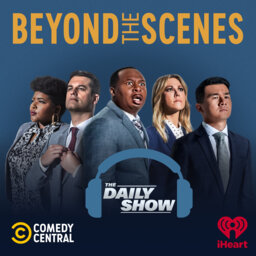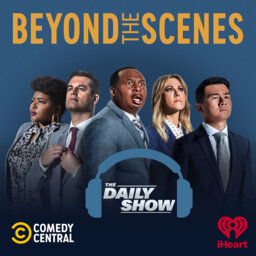Honoring Female Trailblazers: From Recording Studios to the White House
In honor of Women’s History Month, Host Roy Wood Jr. looks back at some of his favorite Beyond the Scenes moments that celebrate female trailblazers. Roy is joined by CNN contributor Kate Andersen Brower and Daily Show producer Jeff Gussow to discuss how first ladies have impacted our nation’s policies. Next, he chats with Daily Show correspondent Dulcé Sloan and producer Chelsea Williamson about how female rappers made a name for themselves in a male-dominated industry. And finally, he’s joined by Daily Show correspondent Desi Lydic and writer Kat Radley to discuss how female pleasure on screen has evolved over the years to be more sex-positive.
 Beyond the Scenes from The Daily Show
Beyond the Scenes from The Daily Show


